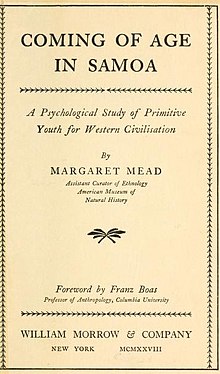 Original title page (1928) | |
| Author | Margaret Mead |
|---|---|
| Language | English |
| Subject | Samoan culture and society |
| Publisher | William Morrow and Co. |
Publication date | 1928 |
| Publication place | United States |
| Media type | Print (paperback) |
| Pages | 297 |
| Text | Coming of Age in Samoa: A Psychological Study of Primitive Youth for Western Civilisation at Wikisource |
| Part of a series on the |
| Anthropology of kinship |
|---|
 |
|
Social anthropology Cultural anthropology |

Coming of Age in Samoa: A Psychological Study of Primitive Youth for Western Civilisation is a 1928 book by American anthropologist Margaret Mead based upon her research and study of youth – primarily adolescent girls – on the island of Taʻū in American Samoa. The book details the sexual life of teenagers in Samoan society in the early 20th century, and theorizes that culture has a leading influence on psychosexual development.
First published in 1928, the book launched Mead as a pioneering researcher and as the most famous anthropologist in the world. Since its first publication, Coming of Age in Samoa was the most widely read book in the field of anthropology until Napoleon Chagnon's Yanomamö: The Fierce People overtook it.[1] The book has sparked years of ongoing and intense debate and controversy on questions pertaining to society, culture, and science. It is a key text in the nature versus nurture debate, as well as in discussions on issues relating to family, adolescence, gender, social norms, and attitudes.[2]
In the 1980s, Derek Freeman contested many of Mead's claims, and argued that she was hoaxed into counterfactually believing that Samoan culture had more relaxed sexual norms than Western culture.[3] However, several members of the anthropology community have rejected Freeman's criticism, accusing him of cherry picking his data, and misrepresenting both Mead's research and the interviews that he conducted.[4][5][6] Mead's field work for "Coming of Age" was also scrutinized, and major discrepancies were found between her published statements and her field data.[7][8] Samoans themselves tend to be critical of what Mead wrote of their culture, especially her claim that adolescent promiscuity was socially acceptable in Samoa in the 1920s.[9]
Coming of Age in Samoa entered the public domain in the United States in 2024.[10]
- ^ John Horgan (12 November 2000). "Hearts of Darkness". New York Times. Retrieved 14 February 2021.
- ^ Felder, Deoborah G. (2003). A Century of Women : The Most Influential Events in Twentieth-Century Women's History. Citadel Press. pp. 135, 135. ISBN 978-0-8065-2526-6. Retrieved 29 August 2010.
- ^ Pinker, Steven (June 22, 2009). How the Mind Works. W. W. Norton & Company. ISBN 978-0393334777. Retrieved 15 September 2014.
Margaret Mead disseminated the incredible claim that Samoans have no passions – no anger between parents and children or between a cuckold and seducer, no revenge, no lasting love or bereavement, ... no adolescent turmoil. Derek Freeman and other anthropologists found that Samoan society in fact had widespread adolescent resentment and deliquency, a cult of virginity, frequent rape, reprisals by rape victim's families, ... sexual jealousy and strong religious feeling.
- ^ Cite error: The named reference
Shankman2009was invoked but never defined (see the help page). - ^ Levine, Robert A. (28 May 2010). "Cutting a controversy down to size". Science. 328 (5982): 1108. doi:10.1126/science.1189202. S2CID 162343521.
- ^ "The Trashing of Margaret Mead". Savage Minds. 13 October 2010. Retrieved 4 August 2017.
- ^ Theodoratus, Robert J. "Not Even Wrong: Margaret Mead, Derek Freeman, and the Samoans." The Social Science Journal, vol. 34, no. 1, 1997, p. 101+. Gale OneFile: Psychology, link.gale.com/apps/doc/A19296207/PPPC?u=tel_a_domi&sid=PPPC&xid=3bf201b2. Accessed 5 Mar. 2021.
- ^ "Not even wrong: Margaret Mead, Derek Freeman, and the Samoans" by Martin Orans, https://openlibrary.org/works/OL2961434W/Not_even_wrong?edition=notevenwrongmarg0000oran
- ^ pp. 54 and 66 of Shankman, Paul. “The ‘Fateful Hoaxing’ of Margaret Mead: A Cautionary Tale.” Current Anthropology, vol. 54, no. 1, 2013, and the response by Leasiolagi Malama Meleisea and Penelope Schoeffel (p. 66), JSTOR, www.jstor.org/stable/10.1086/669033. Accessed 9 Mar. 2021.
- ^ Moss, Aaron (4 December 2023). "Public Domain Day 2024 is Coming: Here's What to Know". Copyright Lately. Retrieved 1 January 2024.